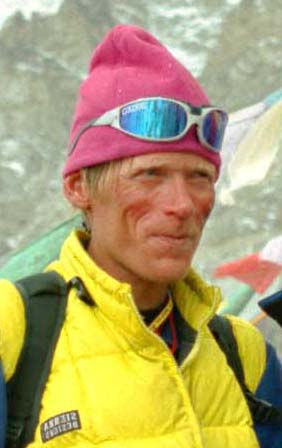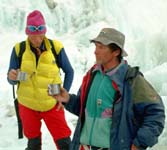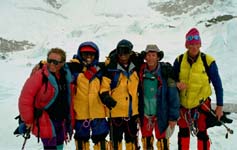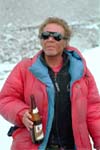

|
ANATOLY BOUKREEV (ALMATY, KAZAKHSTAN) …Risk of death at high altitude is much higher for a strong climber than for a weak one…
Anatoly Boukreev: From one hand I realised how much I know about high altitude climbing, from another hand, I understand that there are plenty of things I do not know yet… The tragedy happened with one of the strongest and experienced Russian climbers. - Don't you think that it is because of his experience Bashkirov took such an responsibility, that he was unable to reject even being in such a critical state? You remember, he told that he is ill before leaving for the summit bid. Anatoly:
I can describe the situation. We came back after guiding Indonesian team to the
Everest. We were guides, advisers, coaches and rescue team. We, Vinogradsky, Bashkirov
and me, participated in such an extraordinary national Indonesian event that took
a lot of energy from us. I do not know about Evgeny and Vladimir, may for them
it was easier. But for me, after tragedy in 1996, when I was severely criticized
whereas I made enormous effort to rescue people, it was very difficult. It looks
like I was a hero but in the same time many thinks that I made mistakes. The best
and most experienced guides died that day. Take Rob Hall, who made a fifth ascent
but died on way down with his client - he was responsible for others, weaker people.
Weaker climbers also died. The storm cut people from the life without distinguishing
who is strong and who is weak. When it began people lost the ability to orientate
on the way down, stayed high and that lead to the lethal end. During that tragedy
I rescued three people, but I have not used supplementary oxygen. They blame me
for that. But I was in such a perfect conditions, I had climbed three eightthousanders
with the last one (Manaslu) just two month before the expedition, I have had amasing
acclimatisation and I felt that I do not need oxygen. This year, after the car
accident, lack of training, two operations, the situation is very different.
- Bashkirov took this burden - he could not tell to people - go without me, I am ill. He was preparing this traverse for 4 years. He could not stay behind... Anatoly: Take, for example, Kangchenjunga expedition (Second Soviet Himalaya Expedition, 1989, traverse of the whole Kangchenjunga massive. Two groups made a whole traverse in different directions and support groups climbed all summits crating stocks of oxygen and other supply - Ed. note). In order to go to this difficult climb the best climbers trained, skip jobs for two years, passed a hard selection to enter the final team of twenty. And all these twenty people worked for the traverse. There was an incredible two years preparation, the best climbers from the Soviet mountaineering school, which is one of the strongest in the World, were selected. And then we made this traverse. We had such a spirit… I was in a perfect condition… The condition of the team… And now I compare the Kangchenjunga traverse with that of Lhotse-Lhotse Shar. These tasks are identical. It is difficult to say which one is harder - Kangchenjunga is longer and higher, Lhotse is more technical. On Kangchenjunga everything was planned and safety was very high, here the preparation is not that good. I can not tell anything negative about this team - I simply do not know. I know my condition 6-7 years ago and now. I can judge the level of Koroteev or, say, Bogomolov. The younger guys… It is impossible to compare conditions of their training with ours in national team. We lived in Esher (sport camp at the Black Sea coast for Soviet Olymipic teams), trained three times per day, eat for 20 roubles per day (average monthly salary in USSR was ~100 roubles). I do not know finances, but nowadays it should be amazingly expensive.
- You were the first on the Lhotse Main?
Anatoly: Only Babanov and Gleb Sokolov were ahead of us. I was permanently
telling Simone not to rush - we still have 2-3 days of hard work on huge altitude.
I left the backpack, but my state did not improve. Bashkirov and Koroteev approached.
Bashkirov started to make a video - everything is OK. Bashkirov always was somewhat
introverted, you could never say about his condition. Bashkirov was Bashkirov.
I told him - "I am leaving real world, I feel bad. Either the acclimatisation
is lost either I am ill". Everything overlapped. Good schedule of the climb
was broken, chronic diseases worsened. To ask them about help - they have a lot
of own problems. But I told that I can stay on the descent. If they will notice
me in snow - do not be surprised… - When you descended what was the Bashkirov's state? He felt worse? Anatoly: I did not noticed, since I was very bad myself. Simone told me that Volodya's eyes changed sharply. - Bashkirov was without goggles?
Anatoly: Sometimes he took goggles off to work with videocamera. He said
nothing about his state. Just said that he will wait the last one and will film
things. It was clear that he feels badly. But weak person - when he feels badly,
he can not climb, he can not work. But a strong man can continue in such a state.
That is why the risk to die at the altitude is much higher for a strong climber,
than fo ra weak one. The weak one have the barrier and he does not climb further,
but a strong one overpowers himself… - The last time when Bashkirov made a radio call was at 12. He should have started to descend, probably help was necessary, but he told to continue work on the mountain, fix ropes. For him personally it was at least 5 more hours to the summit. What does it means? He never radioed again. He stopped to control himself? Anatoly: First of all, he did not realised the situation. Second, he was responsible for the group. He should care about them. Say, I organise some event and I climb together with the team. I can not continue, but the idea remains, the group has to work further. - Why didn't he admit his bad state, did not ask for help of the team? Anatoly: Well, we speak about 12-hour connection, but it may be that his state became very bad at 5-6 or even 8 o'clock. - When did you speak with him? Anatoly: At 4 AM in the Camp, at 1 PM around the summit and around 2-215 on descend. Bashkirov and me climbed Everest, we drained ourselves equally, equally rested in Katmandu and became ill at the same moment. I think that it is not just a coincidence. My condition also changed very fast, in few hours. I was going to the traverse to meet a superchallenge, I trusted into success, I was ready for it. In just four hours, approaching tents at 7900 I started to doubt about our success. Two hours later I felt myself badly, in another two hours I was leaving the real world. Same thing happened with Bashkirov. Simone noted more things and he told that when we spoke with Bashkirov at 1 PM he was smiling and was OK, but just one hour later his conditions changed dramatically. - About rescue operation. Was there such an event on eight tousander that people climbed the mountain, descended to tents and then ascended half way up to rescue? You on Everest climbed for the second time…
Anatoly: I worked for three days without any visibilty. When all experienced
sherpas refused not only to rescue but even to leave tents. And I know what is
this - altitude and rescue work after the climb. I had to do it after Everest.
I managed to save people after oxygenless Everest climb. After this it is difficult
to explain - people do not realise what I have done. Simply it is impossible.
Last year during these three days I was on the limit… - But later they ascended to him again?
Anatoly: Yes, but just to say the last good bye, cover the body, not to
leave it without attention. What they could do they did. - I was surprised when I saw list of team on Makalu (Russian expedition on Makalu wall. It was climbed for the first time and received Piolet d'Or, but two members died -Ed. note). Only Efimov had 4 eight thousanders.
Anatoly: This is a serious problem. If a person has no experience, his
technical level can not compensate it. If there is no experience, the risk to
die increases, moreover, if you are strong but unexperienced - this is even more
dangerous. You easily enters dangerous zone and then … - The death of Russian climbers confirms your words that the best and the strongest die?
Anatoly: I would precise that the highest chances to die are for the strongest
and for the weakest. For those in the middle it is somewhat better. Especially
if there is also a psychological responsibility about the others… - Many regard the climb as a last chance? Anatoly: Yes, they live as if there is nothing after. During last five years I also started to think what I did before and what I do not like to do now. I compared myself with Western climbers. They never risk. They have credit cards, bank account, house in California or somewhere else. He has normal life and he comes here to rest. Somebody's fault can lead to death of another person. In the mountains you should depend on yourself only, on your own strength and that's why it is amoral to think that somebody will save you on the altitude. - Is it easier to work in a team? Anatoly: When you work in a team it is easier. You climb not alone, you share loads. Last year I made, as I think, an extraordinary thing when I rescued people. No one guide attempted to help. Yasuko Namba died - nobody moved to help. I brought oxygen for three - three survived. Yasuko Namba was very close, but she had no oxygen. I gave oxygen to my clients only (I had only two cans). I carried one woman on my shoulders (I helped her, but she was able to move herself) - we covered 400 meters in 40 minutes, strong wind into face. I was simply carrying her. Charlotte Fox. It is better not to be in such a situation. Now she did not remember and does not understand this. A professional can understand, but again, a professional will say - why did you enter such a situation? You should have foreseen it. If you are there - it is your fault. - Last year the tragedy was actively discussed on the West. What will appear in Russia? Six people died this year? Anatoly: About the West. I understood after the last year tragedy that any catastrophe, any accident attracts TV, media. Media are eager to see tragedies. If our Everest climb would be perfect - nobody would ever think about it. And now everybody remembers qualities of these people - as it usually happens after death. In the West it is also related with money. Making what I made you expect some attention, respect, but, in contrast, they started to discuss the tragedy everywhere. Yes, there are a lot of deaths. Last year we made a perfect climb in Himalaya, were going back in minivan and had an accident. 24 years old climber died. Many different things happen.
And after the last year tragedy I do not like many of things happening on the West. People make incredible money on it, showing things, as America wants, not the real picture. Now Hollywood is making a movie. I do not know how will they imagine me - with a Red star, with banner in hands - and how will they show this to American society. It is clear, that it will be completely different from the reality. - Did they discuss this with you? Anatoly: Yes, they try to negotiate, but… It is not important. I would like that in Russia it would be different from the West when any negative event is used to make money. And people forget about everything when they speak about money - you can rewrite history as you like. Everest Base Camp, Nepal, May 1997. Translated by © Andrey Shiryaev 2003 Sourse: video by © Victor Kozlov 1997 Text (redaction) © Elena Laletina 2002 Photo:
© Gleb Sokolov 1997
|



